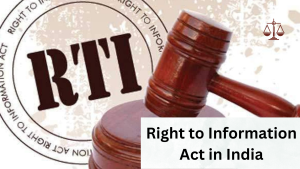25 Nov Analysis of the Right to Information in India
Right to Information Act in India
This article is based on the “Right to Information Act in India“. It talks about the Indian Constitution’s significance of the RTI Act in India.
Relevance for Prelims: Article 19 of the Indian Constitution, Fundamental Rights
Relevance for mains: Transparency and accountability in Right to Information, Chief Information Commissioner, Right to Information Act, 2005.
Issues pertaining to the Right To Information Act in India:
- No one should be a judge in their own cause, according to one of the fundamental principles of natural justice. However, there are instances of the commission permitting, or rather wanting the Ministry itself to act as the judge in their own case and determine if a disclosure is required. This is despite the Ministry being accused of breaking the RTI Act.
- The CIC’s refusal to consider the Internet Freedom Foundation’s appeal of the fresh non-disclosure order issued by the Home Ministry in the phone tapping case led to a similar circumstance.
- In a case that was looking for a disclosure of documents relating to the making of the Unlawful Activities (Prevention) Amendment Act, 2019, the commission has decided to keep the matter pending for final order for a period of more than three months now, something which is unheard of.
- Bureaucrats reject RTIs without any fear, knowing well that they are protected by the Information Commissioners and are not subject to the harsh penalties stipulated in Section 20 of the RTI Act.
About the Right To Information
- Any public body has to accept requests from citizens under the Right to Information Act and citizens are guaranteed to get a response from the Public Information Officer of that body within a time period of 30 days.
- The citizen may file an appeal at the departmental level and then a second and final appeal with the Information Commission in the event of a non-response or disagreement with the response. The State Information Commission in each State hears second appeals involving State agencies.
- It is the Central Information Commission (CIC), at the Centre level.

Pic: Right to Information Act in India
Right to Information Act, 2005:
- It provides with the rules and procedures with regard to citizens’ Right to information.
- The previous Freedom of Information Act of 2002 was replaced by it.
- This law was passed to strengthen the fundamental right, ‘freedom of speech ‘ guaranteed in the Indian Constitution. RTI is an implied fundamental right because it is included in the Right to Freedom of Expression under Article 19 of the Indian Constitution.
Some of the important provisions of RTI Act are:
- Section 4 of the RTI Act requires suo moto disclosure of information by each public authority.
- Section 8 (1) discusses exemptions against furnishing information under RTI Act.
- Section 8 (2) provides for disclosure of information exempted under Official Secrets Act, 1923 if larger public interest is served.
Before the 2019 amendment:
Before the 2019 amendment to the RTI Act, Information Commissioners (ICs) that were appointed to the CIC had an equal status with that of the Chief Election Commissioner, and of a Supreme Court judge. Their term of service was fixed to Five years.
Post 2019 Amendment:
Following the 2019 revisions, the Centre granted itself the authority to alter and decide upon the tenure of Election commissioners whenever it pleased, undermining the commission’s and its personnel’s independence.
RTI’s role a few years back:
- It pronounced that political parties were under the ambit of RTI India Act, and hence were accountable to the public
- It boldly declared that information regarding the Reserve Bank of India’s list of willful loan defaulters and the present Prime Minister’s educational background is within the purview of the RTI Act
- The commission was a strong proponent of transparency in public life.
Way Forward:
Citizens must exert significant pressure on the government to take action and designate trustworthy commissioners. Lawyers must assist willing citizens in bringing cases to court and pursuing justice. India will lose its valued right to know if proper steps are not taken.
Further Readings:
Fundamental Rights
Article 19 of the Indian constitution
Freedom of Information Act of 2002
Right to Information Act, 2005
Amendment to RTI Act
Prelims Question
Question: In which section are the rights and functions of the Central Information Commission mentioned?
1)18 and 19
2)20 and 25
3)12 and 17
4)13 and 15
Which one of the following is the correct option?
a)1 and 2
b)2 and 3
c)3 and 4
d)4 and 1
Mains question
Question: Critically examine the importance of the Right to Information (RTI) as a tool of transparency and accountability in governance.
Source:
Daily Current Affairs for UPSC
Plutus IAS provides Daily Current Affairs for UPSC examination free of cost. Get Current Affairs from us and go through it. Because without reading Current Affairs, No one can pass any competitive examination.
Download PDF:



No Comments